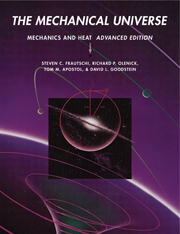Book contents
- Frontmatter
- Contents
- Preface
- Chapter 1 INTRODUCTION TO THE MECHANICAL UNIVERSE (Program 1)
- Chapter 2 THE LAW OF FALLING BODIES (Program 2)
- Chapter 3 THE LANGUAGE OF NATURE: DERIVATIVES AND INTEGRALS
- Chapter 4 INERTIA
- Chapter 5 VECTORS
- Chapter 6 NEWTON'S LAWS AND EQUILIBRIUM
- Chapter 7 UNIVERSAL GRAVITATION AND CIRCULAR MOTION
- Chapter 8 FORCES
- Chapter 9 FORCES IN ACCELERATING REFERENCE FRAMES
- Chapter 10 ENERGY: CONSERVATION AND CONVERSION
- Chapter 11 THE CONSERVATION OF MOMENTUM
- Chapter 12 OSCILLATORY MOTION
- Chapter 13 ANGULAR MOMENTUM
- Chapter 14 ROTATIONAL DYNAMICS FOR RIGID BODIES
- Chapter 15 GYROSCOPES
- Chapter 16 KEPLER'S LAWS AND THE CONIC SECTIONS
- Chapter 17 SOLVING THE KEPLER PROBLEM
- Chapter 18 NAVIGATING IN SPACE
- Chapter 19 TEMPERATURE AND THE GAS LAWS
- Chapter 20 THE ENGINE OF NATURE
- Chapter 21 ENTROPY
- Chapter 22 THE QUEST FOR LOW TEMPERATURE
- Appendix A THE INTERNATIONAL SYSTEM OF UNITS
- Appendix B CONVERSION FACTORS
- Appendix C FORMULAS FROM ALGEBRA, GEOMETRY, AND TRIGONOMETRY
- Appendix D ASTRONOMICAL DATA
- Appendix E PHYSICAL CONSTANTS
- SELECTED BIBLIOGRAPHY
- Index
Chapter 21 - ENTROPY
Published online by Cambridge University Press: 05 August 2013
- Frontmatter
- Contents
- Preface
- Chapter 1 INTRODUCTION TO THE MECHANICAL UNIVERSE (Program 1)
- Chapter 2 THE LAW OF FALLING BODIES (Program 2)
- Chapter 3 THE LANGUAGE OF NATURE: DERIVATIVES AND INTEGRALS
- Chapter 4 INERTIA
- Chapter 5 VECTORS
- Chapter 6 NEWTON'S LAWS AND EQUILIBRIUM
- Chapter 7 UNIVERSAL GRAVITATION AND CIRCULAR MOTION
- Chapter 8 FORCES
- Chapter 9 FORCES IN ACCELERATING REFERENCE FRAMES
- Chapter 10 ENERGY: CONSERVATION AND CONVERSION
- Chapter 11 THE CONSERVATION OF MOMENTUM
- Chapter 12 OSCILLATORY MOTION
- Chapter 13 ANGULAR MOMENTUM
- Chapter 14 ROTATIONAL DYNAMICS FOR RIGID BODIES
- Chapter 15 GYROSCOPES
- Chapter 16 KEPLER'S LAWS AND THE CONIC SECTIONS
- Chapter 17 SOLVING THE KEPLER PROBLEM
- Chapter 18 NAVIGATING IN SPACE
- Chapter 19 TEMPERATURE AND THE GAS LAWS
- Chapter 20 THE ENGINE OF NATURE
- Chapter 21 ENTROPY
- Chapter 22 THE QUEST FOR LOW TEMPERATURE
- Appendix A THE INTERNATIONAL SYSTEM OF UNITS
- Appendix B CONVERSION FACTORS
- Appendix C FORMULAS FROM ALGEBRA, GEOMETRY, AND TRIGONOMETRY
- Appendix D ASTRONOMICAL DATA
- Appendix E PHYSICAL CONSTANTS
- SELECTED BIBLIOGRAPHY
- Index
Summary
For the present I will limit myself to quoting the following result: if we imagine the same quantity, which in the case of a single body I have called its entropy, formed in a consistent manner for the whole universe (taking into account all the conditions), and if at the same time we use the other notion, energy, with its simpler meaning, we can formulate the fundamental laws of the universe corresponding to the laws of the mechanical theory of heat in the following simple form:
1. The energy of the universe is constant.
2. The entropy of the universe tends to a maximum.
Rudolph Clausius in Annalen der Physik, 125 (1865)
TOWARD AN UNDERSTANDING OF ENTROPY
In this chapter we turn our attention to the entropy principle, a concept which, like Newton's second law, is an organizing principle for understanding the world. The principle is relatively simple to state, but understanding its meaning is more challenging.
Through theoretical studies of Carnot's work in 1865, the German physicist Rudolph Clausius introduced a new physical quantity closely linked to energy. He called it entropy, a word which sounds like “energy” and comes from the Greek word for “transformation.” The use of entropy provides a way to analyze the behavior of energy in transformation.
- Type
- Chapter
- Information
- The Mechanical UniverseMechanics and Heat, Advanced Edition, pp. 531 - 546Publisher: Cambridge University PressPrint publication year: 1986



